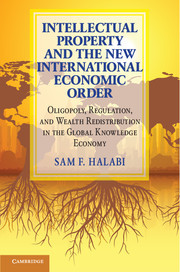Description
Intellectual Property and the New International Economic Order
Oligopoly, Regulation, and Wealth Redistribution in the Global Knowledge Economy
Author: Halabi Sam F.
Developing countries have quietly constructed a network of international agreements that redistribute wealth from the rich to the poor.
Language: English
Subject for Intellectual Property and the New International Economic...:
Approximative price 43.23 €
In Print (Delivery period: 14 days).
Add to cart
Intellectual Property and the New International Economic Order
Publication date: 04-2018
252 p. · 15.2x23 cm · Paperback
Publication date: 04-2018
252 p. · 15.2x23 cm · Paperback
Approximative price 127.71 €
In Print (Delivery period: 14 days).
Add to cart
Intellectual Property and the New International Economic Order
Publication date: 04-2018
252 p. · 15.6x23.5 cm · Hardback
Publication date: 04-2018
252 p. · 15.6x23.5 cm · Hardback
Description
/li>Contents
/li>Biography
/li>
In economic sectors crucial to human welfare ? agriculture, education, and medicine ? a small number of firms control global markets, primarily by enforcing intellectual property (IP) rights incorporated into trade agreements made in the 1980s onward. Such rights include patents on seeds and medicines, copyrights for educational texts, and trademarks in consumer products. According to conventional wisdom, these agreements likewise ended hopes for a 'New International Economic Order,' under which wealth would be redistributed from rich countries to poor. Sam F. Halabi turns this conventional wisdom on its head by demonstrating that the New International Economic Order never faded, but rather was redirected by other treaties, formed outside the nominally economic sphere, that protected poor countries' interests in education, health, and nutrition and resulted in redistribution and regulation. This illuminating work should be read by anyone seeking a nuanced view of how IP is shaping the global knowledge economy.
Introduction: global wealth and the rise of intellectual property; Part I. Movements in Global Wealth Creation and Redistribution: 1. Economic development in low- and middle-income countries after decolonization; 2. The expansion of international intellectual property protection; 3. The merger between international intellectual property, investment, and trade law; Part II. Rethinking Wealth: Firms, Basic Human Needs, and Technology: 4. The pivot to basic human needs; 5. The rise of supranational regulation of global firms; 6. Access to medicines and vaccines; 7. Food and agriculture; 8. Consumer products; 9. Educational and scientific printed works; Part III. International Intellectual Property Shelters: Redistributing Wealth and Regulating Oligopolies: 10. Medicines and vaccines; 11. Biological and plant genetic resources for agriculture; 12. Food and tobacco trademarks; 13. Limiting copyright; Part IV. International Intellectual Property Shelters, Wealth Redistribution, and the Supranational Regulation of Global Firms: 14. International intellectual property shelters as mechanisms of redistribution; 15. International intellectual property shelters and supranational regulation; Conclusion; Index.
Sam F. Halabi is the 2017–18 Fulbright Research Professor in Health Law, Policy, and Ethics at the University of Ottawa. He is also a Scholar at the O'Neill Institute for National and Global Health Law at Georgetown University and an Associate Professor of Law at the University of Missouri. Halabi is the editor of Global Management of Infectious Disease after Ebola (2016) and Food and Drug Regulation in an Era of Globalized Markets (2015). His work is published in JAMA, the Lancet, and the Journal of Law, Medicine, and Ethics. He is also the co-chair (with Gian Luca Burci) of the Ethical, Legal, and Social Implications Working Group of the Global Virome Project. Halabi holds a J.D. from Harvard Law School, an M.Phil. from the University of Oxford, and a B.S., summa cum laude, from Kansas State University.
© 2024 LAVOISIER S.A.S.
These books may interest you

Intellectual Property in Russia 160.25 €



